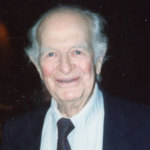Interviewer: Thomas Hager
Interview Date: February 14, 1992
Location: Interview conducted over telephone
Duration: 1:13:44
In this interview, Linus Pauling discusses his political views and activities during and after World War II. The session begins with a discussion of Pauling's life during World War II, including his understanding of the Nazis and his work with scientists who fled Nazi Germany. Pauling also talks about when he briefly hired a Japanese American soldier to work as his gardener, which ultimately led to Pauling's house being graffitied and him receiving threats in the mail.
Pauling then describes how he first began his involvement in politics. He explains that it started with his concern over nuclear weapons, which then became an interest in war generally and led him to study politics. He discusses various politically focused organizations he was a part of, which introduced him to other prominent figures of the twentieth century, including philosophers like Bertrand Russell and famous Hollywood figures.
The interview then goes over how Pauling's political views impacted his career. Caltech asked him to cease his political activities, which caused Pauling to resign from his position as Chairman of the Division of Chemistry and Chemical Engineering. Additionally, a member of the board of trustees quit because he objected to Pauling's presence at Caltech.
The session concludes with Pauling revisiting a statement he made in a previous interview in which he claimed to be a conformist. He maintains that he is often a conformist but is willing to go against the grain in situations that he views as important enough to risk being a non-conformist. He felt his political views were important and was willing to voice them even though they provoked sanctions.
Dublin Core
Title
Description
Pauling then describes how he first began his involvement in politics. He explains that it started with his concern over nuclear weapons, which then became an interest in war generally and led him to study politics. He discusses various politically focused organizations he was a part of, which introduced him to other prominent figures of the twentieth century, including philosophers like Bertrand Russell and famous Hollywood figures.
The interview then goes over how Pauling's political views impacted his career. Caltech asked him to cease his political activities, which caused Pauling to resign from his position as Chairman of the Division of Chemistry and Chemical Engineering. Additionally, a member of the board of trustees quit because he objected to Pauling's presence at Caltech.
The session concludes with Pauling revisiting a statement he made in a previous interview in which he claimed to be a conformist. He maintains that he is often a conformist but is willing to go against the grain in situations that he views as important enough to risk being a non-conformist. He felt his political views were important and was willing to voice them even though they provoked sanctions.

